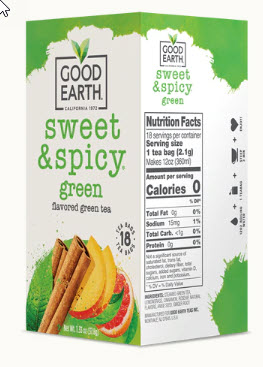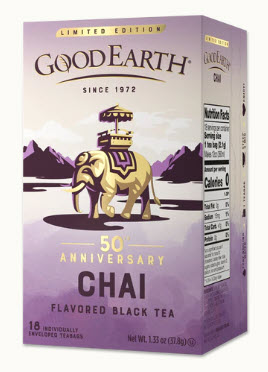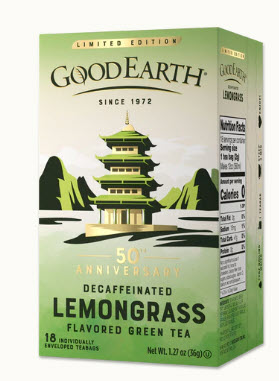The Good Earth brand was founded in 1972 by a Santa Cruz-based herbal tea company that supplied tea to a local restaurant that expanded into a chain of 50 franchises. The brand experimented with herbal blends during its first two decades, producing more than 40 varieties. Tata Consumer Products acquired the company in 2005 and relocated its offices to New Jersey in 2011.
- Caption: Sneha Balasubramaniam, Head of Marketing and Innovation at Tata Consumer Products

Authentic Brand Celebrates Successful Half Century
Sneha Balasubramaniam is head of marketing and innovation at Tata Consumer Products. She is a veteran brand manager who began her career as a marketing manager in Singapore with Tata Consulting Services. She worked for Accenture in Mumbai before rejoining Tata in brand management in 2014. Sneha was named head of marketing and innovation in November 2021.
Dan Bolton: Ninety percent of customers mention authenticity as an important factor in deciding which brands they like and support. Successful tea brands are clear about their core purpose, delivering on the promise of a fine product in engaging and sincere ways. Will you discuss how Good Earth has retained its consumer relevance over a 50-year span?
Sneha Balasubramaniam: Good Earth was born in California back in 1972 so it’s a legacy brand and just like California, it is bright, sunny, fun, flavorful, and wants to bring a smile to the end consumer.
We’re a brand that really believes in positivity and doing good. So that’s at the core of who we are and what we do and what we stand for.
Good Earth started off in a small store as an underdog company doing lots of different permutations and combinations with herbs, which then went on to being teas per se.
In Santa Cruz we happened on what has become a very famous and popular tea, which is the Sweet & Spicy bland. That tea is just unmatched in the eyes of tea consumers.
The tea drinking culture in the US is more than 70% iced tea and there is also a cultural association for drinking tea sweet. The US sweet tea phenomenon is pretty huge compared to anywhere else in the world.
Sweet & spicy had a natural sweetness without adding sugar or any other kind of sweetener to it. The perception of sweetness came from cinnamon. Cinnamon is such a beautiful ingredient because it gives you not only sweetness, but also a bit of spice that adds another dimension.
We hit upon something very beautiful there which addresses consumer needs. So from a product perspective, that’s what we’ve always taken pride in. And from a brand perspective Good Earth does everything with a with a bold flavor, and a bold note, and fun and positive note to it.
So that’s kind of what Good Earth is all about.




Dan: Will you describe how the brand’s core values influence formulations? What guides your sourcing in creating Good Earth blends?
Sneha: We source Rainforest Alliance Certified teas and ingredients and we’re also a founding member of the Ethical Tea Partnership. We have extensively tried to use 100%, natural flavors, nothing artificial. Even from a color perspective we don’t use anything artificial. If you look at the packaging we’ve got a range of sensory blends, which are biodegradable, and tea bags, they’ve got compostable pouches, recyclable cartons, so our commitment is genuinely embodied in sustainability because that no longer is just a jargon or a terminology. Consumers are very well aware of the need for being good to the planet and the environment and, and demonstrating that sustainable awareness in every purchase that they make.
If you talk about ingredients and flavors, you will see a lot of whole flavors. So the beauty and the aroma is not just taste wise, but also visually very appealing. That’s the entirety of the experience that the brand brings.
The other role the brand has started to play is that of democratizing these segments, making it more affordable to consumers. So that everyone can enjoy a good cup of tea and make a sustainable, eco-friendly purchase, and you don’t have break the bank. So let us be that brand that helps you make a conscious effort to benefit the planet, as well as giving you a good quality tea.
Dan: Good Earth has produced thousands of recipes over the years. Why did you relaunch lemongrass and black chai? Do you recall when these flavors were discontinued?
Sneha: I think it was early 2000s when, when it kind of disappeared. When Tata acquired Good Earth as a brand, we had, I think hundreds and perhaps thousands of blends, and I think as a way to optimize, we lost a few, some of the star performers along the way.
How we selected lemongrass is a funny story, actually. On Facebook, I happen to stumble upon a group, which was created by some really passionate consumers that were discussing internally, saying, ‘Hey, I used to love this good old Lemongrass Tea, I can’t seem to find it. Can someone tell me when I can find it?’
I was going through the thread of conversations and found that people have made a few recommendations if, you know, other brands and other ways of getting a similar flavor profile. And it hadn’t really pleased the consumer, and they were numerous. So I thought, wow, you know, we have consumers requesting something and looking out for something that we previously so beautifully did.
Since were were coming up on this 50th anniversary we said why not? Rather than introducing something exotic let’s bring back something that consumers really want and love and reward them with something they’ve been asking for.
We had both a lemongrass and a decaffeinated version, but given the trends and the demand for decaf being a little bit more, we said, let’s introduce the decaf. And we also decided to bring back a classic version of chai, just a simple version of chai.
So yes that’s the story behind the bar of consumers voice and how it actually inspired us to bring back something wonderful.
Dan: The world of chai has really expanded. It’s a brilliant cross over drink in coffee shops. It’s also a niche with a lot of variability. Will you talk about the black chai?
Sneha: I’m from India, so I have memories of mum making Chai at home, and it’s very customized as a beverage. Everyone has their own preference, some want a little bit more ginger, or a little bit more cardamom.
We’re introducing a balanced full-bodied Chai. One of the things we’ve realized in the US, is the need for bold flavors. Our consumers are are not fans of subtlety. When they drink a cup, they want enhanced flavor profiles.
The other thing we’ve noticed is the serving size in the US is little more liberal compared to the serving sizes in rest of the world. So when you have one tea bag, and add 12 ounces of water in a standard coffee mug it really dilutes the flavor profile. We’ve enhance that to mitigate that issue rather than having consumers change their habit and adapt to a smaller size serving. Since we know they’re going to have a coffee cup size of tea we’ve doubled our cardamom, cinnamon, ginger, and clove flavors. So it’s a pretty robust tea.
Sustainability is at the core of everything Good Earth does. We’re working hard to reduce the impact on our environment with plant based teabags, which can be composted in your food waste bins, recyclable cartons, Rainforest Alliance ingredients, and 1% of our profits going to an environmental non-profit.
– Good Earth
We’ve also noticed the flavor of black tea sometimes really gets overridden. Black tea has a beautiful body to it and especially if you’re drinking chai, in the traditional way, with a dash of milk to it, you want that body.
Our tea buying and blending folks have done such a beautiful job in balancing all these different aspects as we bring back something from the past. And there are many types of chai on the market today but this one, I think, really enhances and lets you experience authentic chai flavor.
Dan: Tea consumption per capita in the US is far below many European, Middle Eastern and South Asian countries. Will you share your thoughts on how to increase consumption?
Sneha: That’s a brilliant question. It’s one that we stumbled over as a brand trying to cater to consumers in the US. There is no doubt the US is a coffee drinking country. We should wholeheartedly accept that. The coffee industry is worth close to $100 billion and tea is about about 1/10 of that. That speaks volumes as we face this issue.
Having said that, though, you have many younger beverage drinkers entering the tea and coffee world. We have an opportunity to attract the younger audience who will probably stay with us on the journey for another 20 to 30 years.
Coffee is a hurdle, it is the first choice of beverage when Americans wake up. Coffee is my first cup because I need that caffeine. Then I go on drinking tea and I enjoy it. But the first cup has to be coffee for me. Unfortunately that is the situation.
The second insight I can provide is that with tea it’s not about awareness as much as it is about educating consumers on how to consume and enjoy it. Just from the perspective of tea etiquette I’ve seen consumers add tea to a cup of cold water and microwave it. Not good. What’s happening is that people probably aren’t brewing tea the way it’s supposed to be brewed. This means they aren’t enjoying the beverage to its truest potential.
So I think that bit of education is needed now that you’ve got a new cohort getting into tea drinking to get them to do it right.
Link to share this post with your colleagues
Signup and receive Tea Biz weekly in your inbox.




